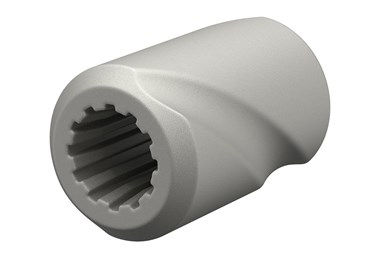Desktop Metal Qualifies D2 Tool Steel for Additive Manufacturing
The company says its Production System binder jetting technology enables production of cold work tool and die parts with high hardness, wear resistance and compressive strength

Binder jetting enables the production of cams in a single printing step. Photo Credit: Desktop Metal
Desktop Metal has qualified the use of D2 tool steel for its Production System platform, which utilizes single pass jetting (SPJ) technology. According to the company, SPJ is designed to achieve the fastest build speeds in the metal additive manufacturing (AM) industry. Businesses can use this technology for the production of parts in high-strength, high-temperature applications such as cold work metal forming tools, dies and punches as well as injection molds with conformal cooling channels.
The company says D2 tool steel is a versatile high-carbon, high-chromium, air-hardening tool steel characterized by its high hardness and compressive strength after heat treatment. This tool steel is said to offer high wear resistance properties, dimensional stability and corrosion resistance in the hardened condition, which is a key benefit for conformal cooling applications. D2 is used for a wide variety of cold work tools that require a combination of wear resistance and moderate toughness, such as coining and sizing tool members, blanking and forming dies, shear cutting tools, gauges, burnishing tools and other wear parts.
Desktop Metal’s materials science team has qualified and fully characterized D2 tool steel printed on Production System technology in accordance with ASTM testing requirements.
One application for D2 tool steel is the production of rotating cams such as those used in oil and gas or chemical processing applications. Typically, these parts require multiple manufacturing steps. However, binder jetting enables the production of cams in a single printing step, reducing both the cost and lead time of the part, while also supporting the production of numerous cam sizes in a single build to accommodate different machines, all without any fixturing or tooling required, the company says.
D2 tool steel is critical for this application because of its hardness and corrosion resistance, which enables a longer lifetime as the cam mechanically interacts with a sliding pin. In addition, because these components are often integrated into machines operating in harsh environments, the corrosion resistance provided by D2 is said to help ensure that the parts will perform as intended and not deteriorate.
Related Content
-
Video: Binder Jetting Production Workflow at Freeform Technologies
Additive manufacturing via binder jetting includes a sequence of downstream steps. During a visit to the Pennsylvania metal 3D printing part producer, I had the chance to walk through this process.
-
Freeform: Binder Jetting Does Not Change the Basics of Manufacturing
Rather than adapting production methodologies to additive manufacturing, this Pennsylvania contract manufacturer adapts AM to production methodologies. In general, this starts with conversation.
-
Desktop Metal Expands Metal Binder Jet Lineup With Shop System+, Shop System Pro
A turnkey metal 3D printing system, the Shop System is an affordable, closed material printer that delivers reliable results with optimized powders, proven parameters and Live Sinter simulation and scanning software.














